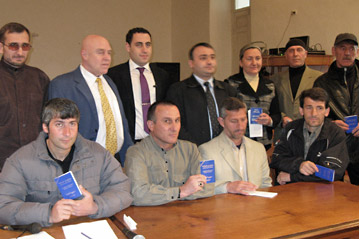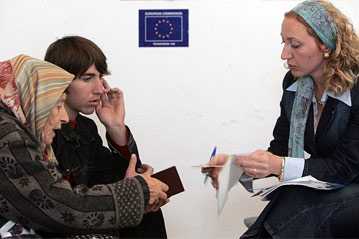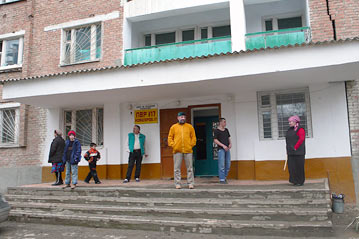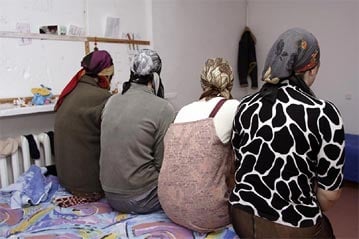Displaced Chechens in Ingushetia's tent camps need housing alternatives, says UNHCR
Displaced Chechens in Ingushetia's tent camps need housing alternatives, says UNHCR

SLEPSTOVKAYA, Ingushetia, June 2 (UNHCR) - Indications of possible camp closures in Ingushetia are raising again the urgent need for alternative accommodation options for displaced Chechens.
There are indications, for example, that the government may be intending to close Camp B in Slepstovkaya, Ingushetia, close to the frontier with Chechnya, in the near future. As of May 27, 1,958 displaced people were registered in Camp B. The UN refugee agency has repeatedly stressed that unless viable options for alternative shelter in Ingushetia are available in the event of closure of the tented camps, returns to Chechnya could not be considered voluntary. Alternatives are also needed in case of evictions of displaced persons from temporary settlements or private accommodation.
UNHCR is emphasising to the government the need for concrete action on alternative shelter. Non-governmental organisations and donors are also prepared to contribute to alternative shelter options.
In particular, shelter options are needed for families living in tented camps who are not willing to return at this stage, but who may feel they face no other choice in light of persistent rumours of imminent camp closures. Many of the displaced Chechens continue to express reluctance to return, primarily citing the security situation in Chechnya as the reason they do not want to go home at this time.
Meanwhile, some displaced Chechens have been returning from Ingushetia in organised return movements arranged by the Chechen Forced Migrants Committee or on their own. The numbers returning picked up in April and May, following a slowdown in March in the period leading up to the March 23 constitutional referendum in Chechnya.
Over 1,600 displaced Chechens returned in April and almost 1,000 returned from May 1 through 27. This compares to less than 600 returns in March. The March figure reflected a sharp drop from the first two months of the year, with 1,400 returning in January and 1,200 in February. By comparison, in all of 2002, according to some sources, nearly 9,500 displaced Chechens returned from Ingushetia, 7,404 of them in organised returns.
At the same time, new displaced people continue to arrive in Ingushetia from Chechnya, with 953 new arrivals from January 1 through May 27.
According to monitors from UNHCR's implementing partner, Vesta, interest in the organised returns has picked up, due at least in part to rumours of camp closures and a sense of fatigue and resignation among the displaced people. Some of them say they would like to secure a place in one of the temporary accommodation centres being built in Chechnya.
The displaced people are also expressing considerable interest in the government's recently announced scheme to compensate residents of Chechnya for property lost due to the most recent conflict. While official figures have not yet been released, media reports indicate that an average family may receive approximately 240,000 roubles ($7,800) for a destroyed dwelling. A draft resolution is currently under consideration by the federal government to determine modalities. Although no official notification of the exact elements of the programme has been issued, the government announced that half of the compensation would be paid before the end of 2003 and the remainder in 2004.
Another concern for displaced Chechens is their registration status. The authorities stopped registering new arrivals to Ingushetia in April 2001. More recently, authorities have de-registered several hundred displaced Chechens, particularly those staying in temporary settlements.
The reasons for the de-registration are not always clear, and UNHCR protection staff and its implementing partners are helping individuals to appeal these decisions. UNHCR has also raised these concerns directly with the migration authorities in Ingushetia, and recently 14 out of the first 22 cases presented by the refugee agency have been re-registered.
Lack of registration of new arrivals and de-registration of families already in Ingushetia increase the vulnerability of the displaced people and the pressures on them to return home. De-registration can also result in suspension of government subsidies for gas and electricity and food distribution and increase pressures for owners of the temporary settlements to evict the residents.
In all, as of May 27, some 89,000 displaced Chechens in Ingushetia are registered for assistance with UNHCR's implementing partner, the Danish Refugee Council. Of these, some 14,000 live in tent camps, 27,000 are in temporary settlements such as converted farm or industrial buildings, and almost 48,000 are in private accommodation or living with host families.








